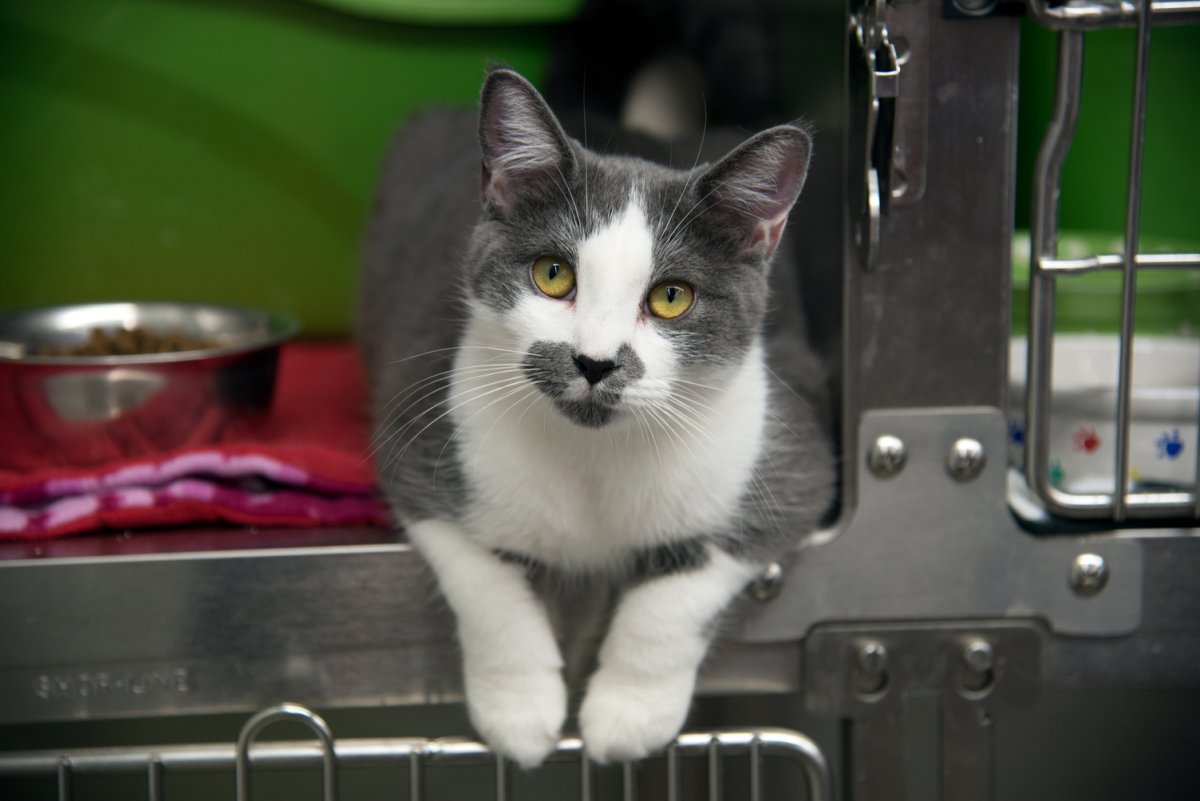
Lacey, Jack, Freya, Taco–naming a cat is a big (and exciting) decision. But what happens when you adopt a cat that already has a name?
Animal shelters almost always assign pets names even if they’re rescued as strays. Sure, you fall in love with a cat’s cute face, but adopting an animal is about more than good looks. Giving a shelter animal a name gives them an identity.
Animal shelters need to market their animals to attract as many potential adopters as possible. That doesn’t mean, however, that every name is a winner.
Key Takeaways
It’s possible to change an adopted cat’s name, especially if done within the first few weeks of adoption.
Use positive reinforcement, like treats and praise, each time you call your cat by its new name to help them learn it.
Gradually phase out the old name while consistently using the new one until the cat responds reliably.
There’s always a chance that you fall in love with the cat, but not their name. The good news is, that most animal advocates agree that it’s okay to change an adopted cat’s name. Here’s what you need to know.
Do Cat’s Even Know Their Names?
Picking the perfect name for a cat could involve hours of discussions, long lists of possibilities, and even years of thoughtful daydreaming. But while we debate the merits of Macy versus Molly, what are our cat’s thinking? Do they even know their names?
We can’t know for certain, but a 2019 study concludes that most cats probably recognize their names as words referring to themselves. The study involved observation of 78 cats in different living conditions.
Researchers observed the cats’ behavior to determine if they could distinguish between their names and other random words. Observers marked when cats seemed interested in the words spoken to them, and the compiled data suggests most of the cats did indeed respond to their own names more than random words.
The results of this study suggest cat’s might know their names, but other researchers say the evidence is still inconclusive. An article in Smithsonian Magazine suggests cats might simply respond to their names because they associate those words with things like food, playtime, or attention.
Either way, we know cats pay attention to the names we call them–or at least the words we say when we interact with them. Therefore, naming a cat is as important as we make it out to be. Your cat probably doesn’t care whether you go with Thomas or Tiger, but your strong relationship has to start somewhere, and that somewhere is with the perfect name.
Is It a Good Idea to Change an Adopted Cat’s Name?
When a shelter employee or volunteer names a cat Hamburger, because they’ve already named 20 cats that week and are running out of ideas, they’re not branding that cat for life. Most shelters assume the new owners will change the cat’s name and might ask even before they print the paperwork.
But even if they don’t, and even if you’re adopting an adult cat that has had the same name for years, it’s generally understood that with new owners comes a new name. Here are a few things to consider before you decide to keep your cat’s name or try on something new.
It Could Be a Much-Needed Fresh Start
Regardless of your cat’s past life, the fact that they ended up in a shelter means something went wrong. They could have been an owner surrender or a victim of neglect, abuse, or abandonment.
It’s also possible they had humans who loved them, but one open window later, and that beloved house cat became a lost stray. It’s also common for cats to end up in shelters when their owners pass away. The point is, going to a shelter and being adopted is supposed to be a fresh start. It’s the cat’s chance to leave behind the pain of the past and start a new life with new people.
That deal comes with a new family, new home, and sometimes, a new name. Many rescue animal advocates encourage pet owners to change an animal’s name because it helps signify that important transition. By learning a new name, the cat can move forward without being reminded of negative associations attached to their old name.
Prioritize Your Relationship
You can’t help the fact that you fell in love with a cat that happens to have the same name as that terrible boss you had in high school.
Also Read: 6 Subtle Signs Your Cat Loves You
Or maybe your new cat is named something like Sausage or Princess Popsicle, and it’s simply not a good fit. If you’re going to wince in embarrassment every time you say your cat’s name or flashback to those late night shifts in front of the fryer, a name change is justified.
The last thing you want is for your new pet’s name to interfere with your relationship. Your bond is something that has to grow with time. You might get used to a name you hate, but it’s not the ideal way to start a friendship.
Consider Your Cat’s Age
If you’re on the fence about whether you like your adopted pet’s shelter name or want to change it, think about your cat’s age.
If you’re adopting a kitten younger than six months, for example, the baby probably hasn’t been alive long enough to even know they have a name. Kittens are clean slates when it comes to names, and you can feel free to pick a name you like after adoption.
If your new family member previously had a home, there’s a chance they’ve already learned a name and are used to it. Young cats older than six months have had ample time to learn what they’re called and make applicable associations. At this age, however, cats are typically more accepting of change.
Also Read: How To Take Care Of A Kitten: The Complete Guide
Once a cat reaches middle age or senior status, change becomes more difficult. Cats are creatures of habit, and breaking well-established habits will always come with some degree of challenge–and that’s regardless of species.
It will be harder to change an older cat’s name, but not impossible. It will require a lot of positive reinforcement and patience.
A senior cat might already be stressed about their new situation, and they might not have the bandwidth to notice that you’re calling them Leo instead of Lionel. Take it slow and weigh your cat’s behavior and the potential causes with how important the name change is to you.
When Shouldn’t You Rename an Adopted Cat?
If your cat is showing signs of extreme anxiety, fear, or discomfort, their previous name might offer a level of comfort and familiarity. With a new family and a new house, repeated attempts to train them to respond to a new name might simply be too much. These are extreme cases, however, and they aren’t common. In most situations, a new name won’t have much effect on a cat’s day-to-day life.
Tips To Change Your Cat’s Name
If after all that thought and deliberation you decide to change your adopted cat’s name, follow these tips to ensure a smooth transition.
Change Your Cat’s Name Right Away: If you start your relationship by calling your cat their old name, but then switch to a new name after two weeks, you’ll only cause confusion.
Start With a Hyphenation: If your cat already knows their old name, you can help them learn their new name with a simple hyphenation. For example, if their old name is Lucky and you want to change it to Luna, start calling them Lucky-Luna for a few days. The first name will get their attention while also creating an association with the new name. After a week or two, drop the old name.
Use Positive Reinforcement: Every time you say your cat’s new name, offer them a treat, praise, or pets (or all three!). They’ll start to love the new name and pay more attention to it.
Have Realistic Expectations: Studies tell us cats might be capable of learning their names, but real-life experience tells us cats do what they want. If they don’t respond to their new name, don’t be discouraged. It could just be because they’re feline and don’t feel like responding at that moment. Keep using their name, and they’ll eventually come around.
Frequently Asked Questions
Can you change a cats name after 6 months?
Young cats older than six months have had ample time to learn what they’re called and make applicable associations. At this age, however, cats are typically more accepting of change so it is possible to change a cats name after 6 months.
Can you change a cat’s name after 2 years?
Once a cat reaches middle age or senior status, change becomes more difficult. Cats are creatures of habit, and breaking well-established habits will always come with some degree of challenge–and that’s regardless of species. So if you do decide to go ahead and change your cat’s name please be patient with her and help her through the process.






